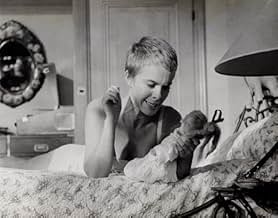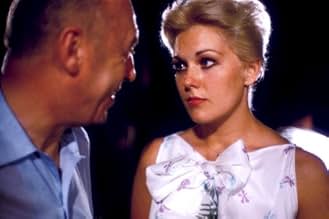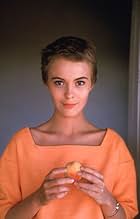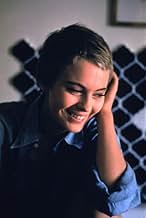CALIFICACIÓN DE IMDb
6.8/10
6.1 k
TU CALIFICACIÓN
Cecile es una joven que vive una vida exuberante con su padre Raymond, un viudo. Cuando Anne, el antiguo amor de Raymond, llega para una visita, Cecile teme que su estilo de vida se altere y... Leer todoCecile es una joven que vive una vida exuberante con su padre Raymond, un viudo. Cuando Anne, el antiguo amor de Raymond, llega para una visita, Cecile teme que su estilo de vida se altere y se propone asegurarse de que no sea así.Cecile es una joven que vive una vida exuberante con su padre Raymond, un viudo. Cuando Anne, el antiguo amor de Raymond, llega para una visita, Cecile teme que su estilo de vida se altere y se propone asegurarse de que no sea así.
- Dirección
- Guionistas
- Elenco
- Nominada a1 premio BAFTA
- 2 nominaciones en total
Tutte Lemkow
- Pierre Schube
- (sin créditos)
Maryse Martin
- Undetermined Secondary Role
- (sin créditos)
Edouard F. Médard
- Bit part
- (sin créditos)
Jackie Raynal
- Dancer
- (sin créditos)
- Dirección
- Guionistas
- Todo el elenco y el equipo
- Producción, taquilla y más en IMDbPro
Opiniones destacadas
Reviews of this film are more interesting and thought provoking than most. A number of them convey critical insights that certainly deepened my appreciation. Yes, the film is flawed, but it also resonates beyond standard soap opera mainly because of its tragic central premise. That the movie doesn't fully realize its aim, I'm sorry to say, is largely because of limitations in Seberg's performance. I agree, she's a lively and compelling screen presence with a freshness that's genuinely appealing. However, the role of Cecile calls upon more emotional depth than Seberg manages to convey, especially with the absence of troubled emotions. Thus the sense of tragic outcome stems from sources other than Seberg's performance. Now, there are several ways of looking at Cecile's emotional make-up and maturity, but there's one I believe that most strongly recommends itself and also puts Seberg's performance in the best light.
On this view, Seberg has Cecile's character just right during the sunny Technicolor phase. Cecile is simply too immature to realize the potential consequences of her scheming actions. Thus, Cecile (Seberg) attaches no more gravity to breaking up her father's relationship than she does to skipping her studies. She's all spoiled selfishness wrapped in a winsome smile. And it's not until the car crash that she realizes the consequences of her selfish act, and experiences an emotional depth for the first time. Her scheme thus results not from making a wrongful choice but from not even realizing that a choice is being made. This view would vindicate nine-tenths of Seberg's unconflicted Technicolor performance, but not the black- and-white phase where Seberg fails to convey the conflict required. This view would also explain the added features of narration, color change and Saul Bass graphics once Preminger realizes that Seberg's performance is not enough to convey the necessary sense of tragedy.
Despite this central flaw, the movie remains oddly haunting. Maybe it's because of a sun- washed paradise so carelessly lost, or of a summer of such promise turned into a lifetime of regret. I really like the observation that father and daughter behave as though actions have no consequences. As a result, their humanity is only realized once the importance of this lesson is tragically driven home. Only by then, it's too late. In my view, the movie remains regrettably underrated.
On this view, Seberg has Cecile's character just right during the sunny Technicolor phase. Cecile is simply too immature to realize the potential consequences of her scheming actions. Thus, Cecile (Seberg) attaches no more gravity to breaking up her father's relationship than she does to skipping her studies. She's all spoiled selfishness wrapped in a winsome smile. And it's not until the car crash that she realizes the consequences of her selfish act, and experiences an emotional depth for the first time. Her scheme thus results not from making a wrongful choice but from not even realizing that a choice is being made. This view would vindicate nine-tenths of Seberg's unconflicted Technicolor performance, but not the black- and-white phase where Seberg fails to convey the conflict required. This view would also explain the added features of narration, color change and Saul Bass graphics once Preminger realizes that Seberg's performance is not enough to convey the necessary sense of tragedy.
Despite this central flaw, the movie remains oddly haunting. Maybe it's because of a sun- washed paradise so carelessly lost, or of a summer of such promise turned into a lifetime of regret. I really like the observation that father and daughter behave as though actions have no consequences. As a result, their humanity is only realized once the importance of this lesson is tragically driven home. Only by then, it's too late. In my view, the movie remains regrettably underrated.
Wealthy playboy father and his precocious seventeen-year old daughter share a sassy, flirty relationship with one another while teasing and leading-on potential romantic partners for both. But the fun and games are called to a halt once dad is reunited with an old friend of the family, a chic fashion designer who would like to see both father and daughter get serious about their lives. Talented writer Arthur Laurents adapted his screenplay from Françoise Sagan's book, yet even with Otto Preminger directing a classy cast, this soaper set on the Riviera never comes to a boil. Preminger sees the idle rich as spoiled and decadent, dancing away mindlessly into the night, yet the players (David Niven and gamine Jean Seberg as father and daughter, Deborah Kerr as Niven's fiancée) bring a lot more heart and human interest to the piece than was probably intended. As such, the characters are more embraceable than the writing and handling, and portions of the film are puzzling or awkward. Still, film-lovers of this era in cinema will no doubt bask in the lush surroundings, not to mention in the enjoyable performances and beautiful photography (black-and-white for the present day, color for the past). The script might have benefited from more honesty in the finale--the 'irony' in bringing these dead-end lives full circle isn't very cutting--and there are two supporting characters who are given the shaft by Laurents. There are certainly pleasures to be had here, however, most notably in the scenes between Kerr and Seberg. **1/2 from ****
Film makers love to show off the Rivera, and for good reason. It's one of the most spectacular venues in the world. However, it's interesting to compare Preminger's Rivera with those of Hitchcock in "To Catch a Thief" and Powell's in "The Red Shoes". In "The Red Shoes" the Riviera is merely a setting in which artists work obsessively to create their art while paying virtually no attention to it. For Hitchcock, the Riviera is a lush background for intrigue. In Preminger's "Bonjour Tristesse" the Riviera represents the lifestyle that the characters desire; luxurious, sensual, hedonistic and, ultimately, empty. "Bonjour Tristesse" is worth seeing for the Riviera, which looks fabulous, and Jean Seberg, who looks fabulous. However, the story is as shallow as the characters.
I do not think that it would be giving away the plot to say that the viewer is led to believe from the very beginning that he is seeing a tragedy. After all, the title translates as "Hello, Sorrow". Furthermore, the opening exposition, filmed in somber black-and-white, leads one to believe that the lives of the protagonists have been devastated by some great tragedy. However, from the very beginning it is also obvious that this impression is not true at all. The father and daughter are depicted as a pair of shallow, selfish, hedonists who care nothing for anything or anyone beyond each other and their own immediate gratification.
The story does not even mention exactly what, if anything, it is that the father does for a living. He is obviously extremely wealthy, but is never seen to do any sort of work or transact any business. It was apparently sufficient for the author that he should be nothing more than a rich, idle, middle-aged playboy who changes his cars as frequently as his daughter, who never wears the same outfit twice, changes her clothes.
In short, not only are the characters in this story not real people, they are not even sympathetic unreal people. It's bad enough having to put up with an hour and a half movie about mannequins without them having to be unlikable mannequins.
I do not think that it would be giving away the plot to say that the viewer is led to believe from the very beginning that he is seeing a tragedy. After all, the title translates as "Hello, Sorrow". Furthermore, the opening exposition, filmed in somber black-and-white, leads one to believe that the lives of the protagonists have been devastated by some great tragedy. However, from the very beginning it is also obvious that this impression is not true at all. The father and daughter are depicted as a pair of shallow, selfish, hedonists who care nothing for anything or anyone beyond each other and their own immediate gratification.
The story does not even mention exactly what, if anything, it is that the father does for a living. He is obviously extremely wealthy, but is never seen to do any sort of work or transact any business. It was apparently sufficient for the author that he should be nothing more than a rich, idle, middle-aged playboy who changes his cars as frequently as his daughter, who never wears the same outfit twice, changes her clothes.
In short, not only are the characters in this story not real people, they are not even sympathetic unreal people. It's bad enough having to put up with an hour and a half movie about mannequins without them having to be unlikable mannequins.
A good-for-nothing, unhappy high society girl recalls a summer when she destroyed the love of her rich playboy father and his respectable bride, because she was afraid of finishing their hedonistic lifestyle.
Well-acted, starry cast and very graciously made but, in atmosphere, oddly faithless adaptation of a sharply cynical novel, which tends to glamorize and ennoble its originally unlovable characters against luxurious backgrounds. It holds the interest, however, and the glossily colorful photography of the sunlit French Rivera in the past alternating with the bleakly black and white present, is particularly excellent.
Well-acted, starry cast and very graciously made but, in atmosphere, oddly faithless adaptation of a sharply cynical novel, which tends to glamorize and ennoble its originally unlovable characters against luxurious backgrounds. It holds the interest, however, and the glossily colorful photography of the sunlit French Rivera in the past alternating with the bleakly black and white present, is particularly excellent.
The wonderfully fresh and vivacious Jean Seberg here shines in her second film. The previous year she had played Joan of Arc (chosen from 18,000 young girls who auditioned for the role), and here Otto Preminger directs his protégé again to superb effect. The film opens with very dramatic music by Georges Auric. This film is based upon the best-selling first novel by the young Francoise Sagan, which created a scandal then but now is not scandalous at all. What passed for 'decadence' at the time was a life of aimless idling by the rich on the Riviera, some gambling, some boating, some swimming, some affairs, and a great deal of insipid self-indulgence. This we see epitomised in Seberg's father, played to perfection by David Niven, a shallow idler and womanizer who straightens his bow tie self-consciously between seductions in the bushes. He and Jean have a 'father-and-daughter-thing' because her mother died long ago, and they really don't want anybody else in their lives apart from casual partners with whom they can romp, only to throw them away when used, joking about them to each other as they get ready to have an evening out. As the film opens, Niven's girlfriend of the moment is Elsa, a charmingly empty-headed creature played delightfully by Mylene Demongeot, who shows such talent as a restrained comedienne. Juliette Greco makes a full-throated appearance in a club, singing the film's theme song all the way through as the dancing and whirling Jean stares at her glassy-eyed over men's shoulders, lost in haunted visions of regret. In 1958, the teenage girls of Britain all swooned over and identified with Jean Seberg, who seems to have originated the shorn boyish haircut which Mia Farrow later copied. Niven as the amiable cad was pretty much what one would expect. But into this mix comes Miss Straight, in the form of Deborah Kerr, who says to Niven when he gets flirty: 'I don't want to be casual.' That's for sure. When Niven finally decides he wants to marry her, she becomes a Little Hitler in no time, bossing Jean around, stopping everyone having 'fun', and generally making herself odious with her control-freakery. This leads to a campaign to drive her out by Jean and Elsa, who has been unceremoniously dumped. Meanwhile, Kerr has fallen hard, and in a revealing shot in the harsh sun we even discover that her true complexion was rather gingery and freckly, something concealed in her other films. Tragedy is not long in coming, hence the 'tristesse'. This is a social document of the 1950s which people interested in knowing what things were once like should watch. The film is directed by a master, Preminger, and Jean Seberg 'makes it' entirely. She is so refreshing, natural, young, real. Poor Jean Seberg. By the age of 40 she was dead. But she left much to remember her by: no one who has seen 'Breathless' (1960) can ever forget her. This film too keeps her wonderful memory alive. Her best acting performance was probably in 'Lilith', but she does well enough here, wholly dominating the screen and acting circles round the old pros. Oh yes, and then there's the inside joke about Eveline Eyfel playing three identical sisters who act as the maid, which is an amusing touch. The Mediterranean sparkles in the sunshine, the pine trees along the beach are exuding their aroma, swim suits dry in minutes: come on in, the water's fine!
¿Sabías que…?
- TriviaOtto Preminger always liked this film, although he felt the American critics did not do it justice. The film was a qualified success in France, yet American critics felt the film wasn't French enough, a detail that amused Preminger.
- ErroresWe hear the Band at c.6'50" and we see a clarinet-player performing, but the music has no clarinet part whatsoever included at that point in the soundtrack. Later, when the clarinet does eventually join the soundtrack, the fingering of the player bears absolutely no relation to the music actually being heard.
- ConexionesEdited into Histoire(s) du cinéma: Une histoire seule (1989)
Selecciones populares
Inicia sesión para calificar y agrega a la lista de videos para obtener recomendaciones personalizadas
Detalles
Taquilla
- Total a nivel mundial
- USD 446
- Tiempo de ejecución
- 1h 34min(94 min)
- Color
- Relación de aspecto
- 2.35 : 1
Contribuir a esta página
Sugiere una edición o agrega el contenido que falta



































